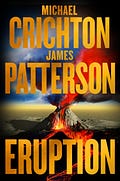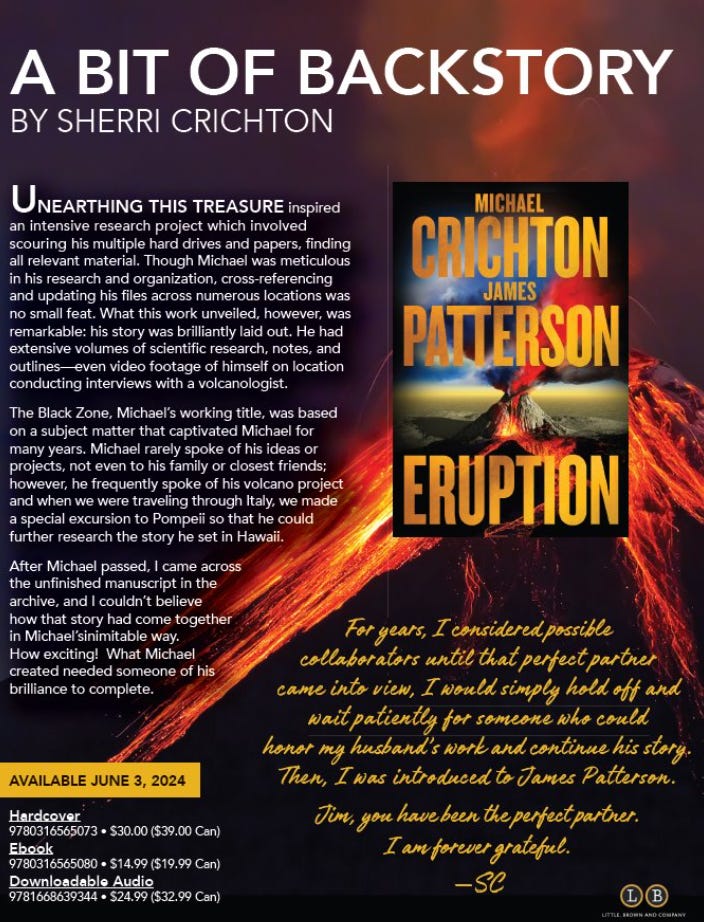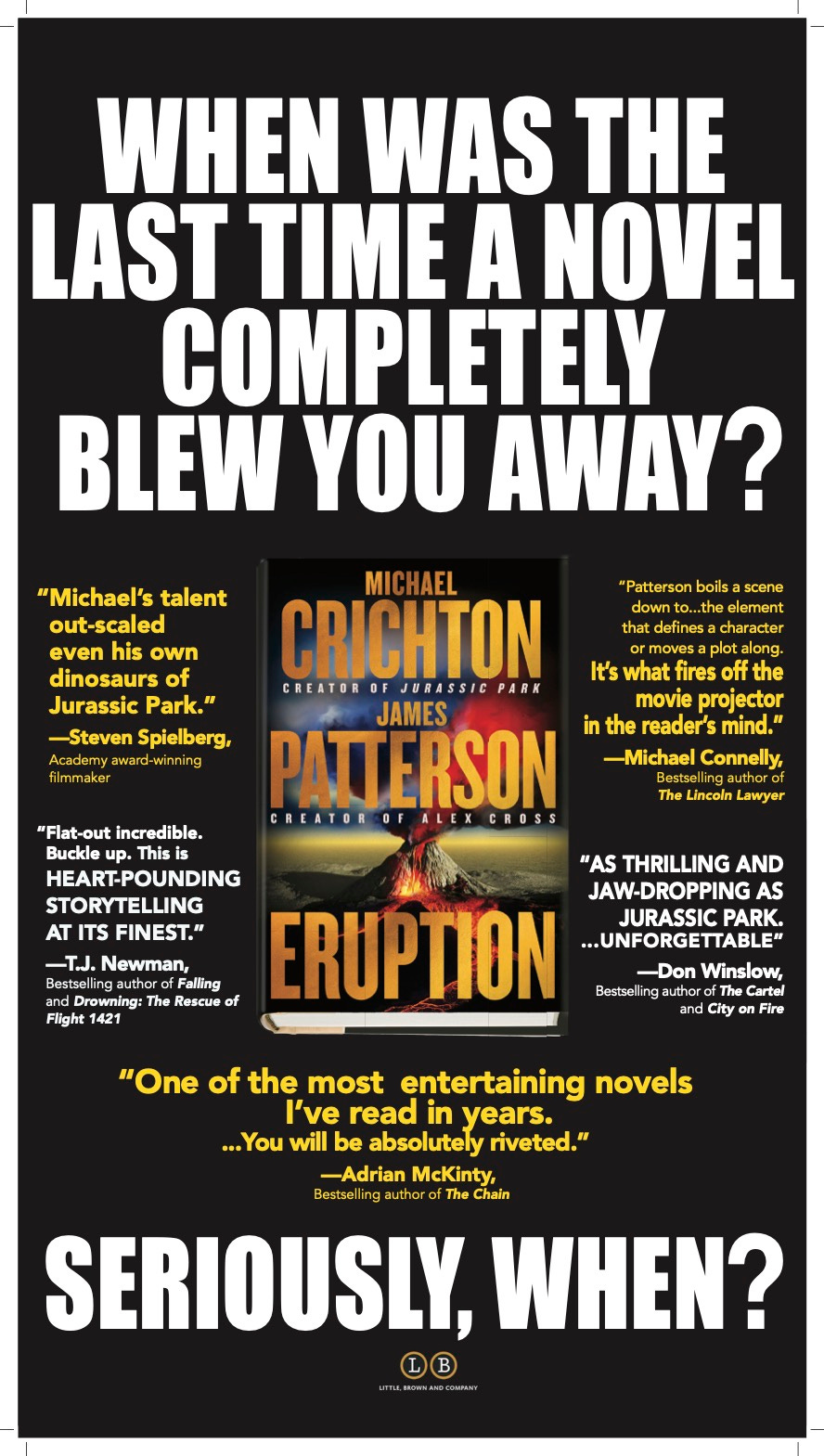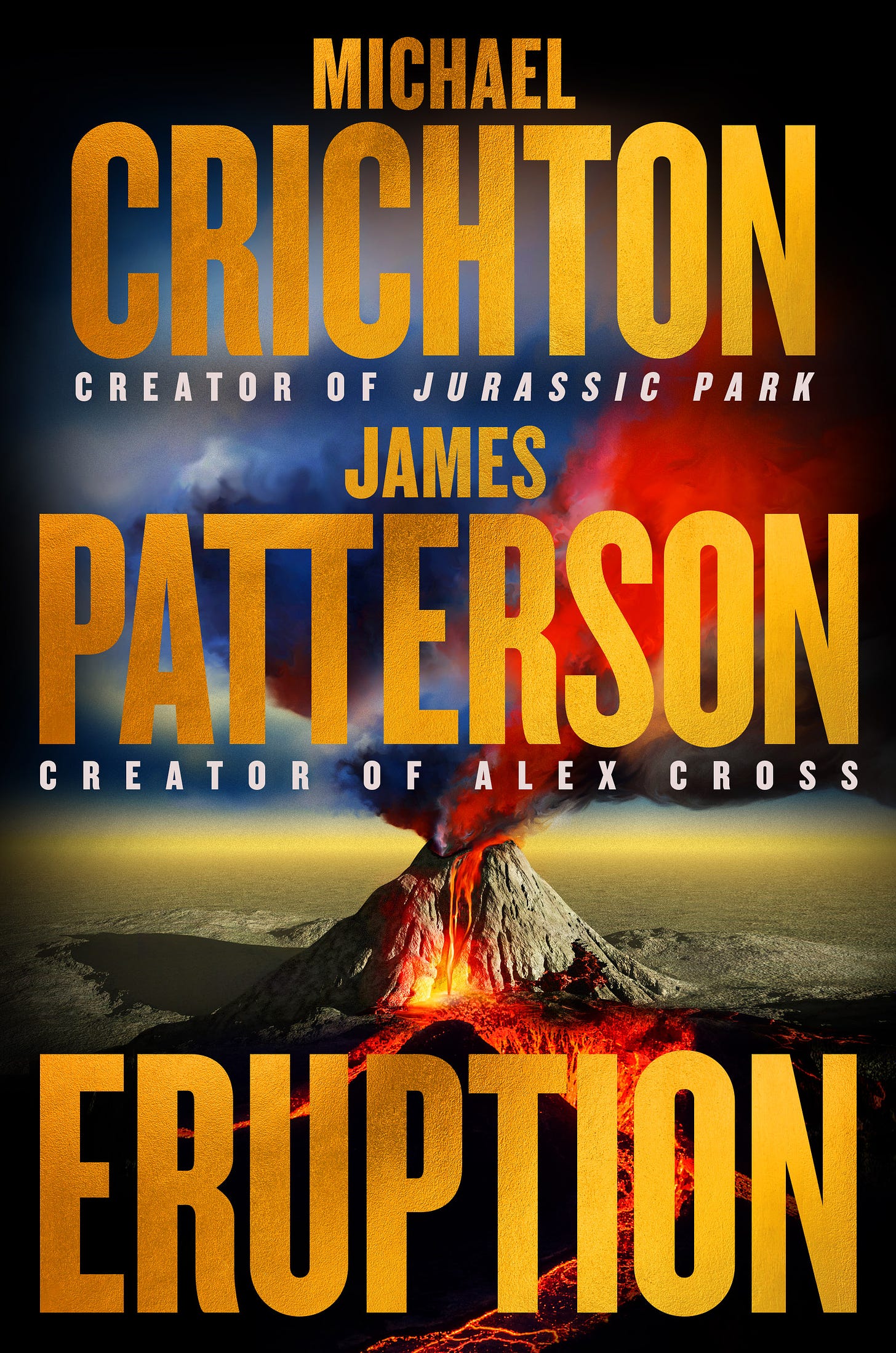Hi there.
What should I call you? Fellow reader? Writer? I guess we'll figure it out eventually. I'm James Patterson, and I have some news. I'm joining Substack. Happily, joyfully.
I'm anxious to start sharing a behind-the-scenes look into my writing, my reading, my messed-up thoughts about this messed-up world. It'll start this fall. I think, I hope, it will be stimulating. I'm pretty sure it will be surprising. I'm not who you think I am. Hell, I'm much worse.
Since I'm here now, since we're here now, I want to give you a teaser. Below, you'll find a sneak peek look at Eruption. It's my new novel, out tomorrow (June 3rd), co-written with the great Michael Crichton. Jurassic Park, Westworld, ER, that Michael Crichton.
Eruption is a special project for me. It's unlike anything I've done before. It's pacey, but with a lot of science. Michael loved his science. This was Michael's passion project, and it was entrusted to me by his widow, Sherri. I'm hoping you'll like Eruption. Personally, I had read everything Michael Crichton wrote. I was a fan. I still am. I think Eruption, what the two of us wrote, is one of his good ones. You'll be the judge of that.
See you in the fall on Substack.
Eruption - Prologue
“The volcanoes aren’t going to explode today, are they?” a little girl asked, her large brown eyes pinned to the twin peaks: Mauna Loa, the largest active volcano in the world, and Mauna Kea, which hadn’t erupted in more than four thousand years.
“If they even think about it,” Rachel Sherrill said, “we’re going to build a dome over them like we do with those new football stadiums. We’ll see how they like that next time they try to blow off a little steam.”
But not all the fifth-graders were laughing at the joke told by the chief botanist of the Hilo Botanical Gardens.
“Why is this tree turning black, Ms. Sherrill?” an inquisitive boy with wire-rimmed glasses sliding down his nose called out.
Christopher had wandered away from the group and was standing in front of a small grove of banyan trees about thirty yards across the lawn.
In the next instant, they all heard the jolting crash of what sounded like distant thunder. Rachel wondered, the way newcomers to Hawai‘i always wondered, Is a big storm coming or is this the start of an eruption?
As most of the children stared up at the sky, Rachel hurried over to the studious, bespectacled boy who was looking at the banyan trees with a concerned expression on his face.
“Now, Christopher,” Rachel said when she got to him, “you know I promised to answer every last one of your questions—”
The rest of what she’d been about to say collapsed in her throat. She saw what Christopher was seeing—she just couldn’t believe her eyes.
It wasn’t just that the three banyan trees closest to her had turned black. Rachel could actually see inky, pimpled blackness spreading like an oil spill, some terrible stain, except that the darkness was climbing up the trees. It was like some sort of upside-down lava flow from one of the volcanoes, but the lava was defying gravity, not to mention everything Rachel Sherrill knew about plant and tree diseases.
She bent low to the ground and saw suspicious dark spots leading up to the tree, like the tracks of some mythical round-footed animal. Rachel knelt down and felt the spots. The grass wasn’t moist. Actually, the blades felt like the bristles on a wire brush.
None of the blackness had been here yesterday.
She touched the bark of another infected tree. It flaked and turned to dust. She jerked her hand away and saw what looked like a black ink stain on her fingers.
“These trees must have gotten sick,” she said.
As she ushered the kids back to the main building, her mind raced to come up with possible explanations for what she’d just witnessed. But nothing made sense. Rachel had never seen or
read about anything like this. It wasn’t the result of the vampire bugs that could eat away at banyan trees if left unchecked. Or of Roundup, the herbicide that the groundskeepers used overzealously on the thirty acres of park that stretched all the way to Hilo Bay. Rachel had always considered herbicides a necessary evil—like first dates. This was something else. Something dark, maybe even dangerous, a mystery she had to solve.
When the children were in the cafeteria, Rachel ran to her office. She checked in with her boss, then made a phone call to Ted Murray, an ex-boyfriend at Stanford who had recommended her for this job and convinced her to take it and who now worked for the Army Corps of Engineers at the Military Reserve.
She explained what she had seen, knowing she was talking too quickly, her words falling over each other as they came spilling out of her mouth.
“On it,” Murray said. “I’ll get some people out there as soon as I can. And don’t panic.”
“Ted, you know I don’t scare very easily.”
“Tell me about it,” Murray said. “I know from my own personal experience that you’re the one usually doing the scaring.”
She hung up, knowing she was scared, the worst fear of all for her: not knowing. While the children continued noisily eating lunch, she put on the running shoes she kept under her desk and ran all the way back to the banyan grove.
There were more blackened trees when she got there, the stain creeping up from distinctive aerial roots that stretched out like gnarled gray fingers.
Rachel Sherrill tentatively touched one of the trees. It felt like a hot stove. She checked her fingertips to make sure she hadn’t singed them.
A voice came crackling over the loudspeakers—Rachel Sherrill’s boss, Theo Nakamura, telling visitors to evacuate the botanical gardens immediately.
“This is not a drill,” Theo said. “This is for the safety of everyone on the grounds. That includes all park personnel. Everyone, please, out of the park.”
Within seconds, park visitors started coming at Rachel hard. The grounds were more crowded than she had thought. Mothers fran as they pushed strollers ahead of them. Children ran ahead of their parents. A teen on a bike swerved to avoid a child, went down, got up cursing, climbed back on his bike, and kept going. Smoke was suddenly everywhere.
“It could be a volcano!” Rachel heard a young woman yell.
Rachel saw two army jeeps parked outside the distant banyan grove. Another jeep roared past her; Ted Murray was at the wheel. She shouted his name but Murray, who probably couldn’t hear her over the chaos, didn’t turn around.
Murray’s jeep stopped, and soldiers jumped out. Murray directed them to form a perimeter around the entrance to the grove and ensure that the park visitors kept moving out.
Rachel ran toward the banyan grove. Another jeep pulled up in front of her and a soldier stepped out.
“You’re heading in the wrong direction,” the soldier said.
“You—you don’t understand,” she stammered. “Those —they’re my trees.”
“I don’t want to have to tell you again, ma’am.”
Rachel Sherrill heard a chopper engine; she looked up and saw a helicopter come out of the clouds from behind the twin peaks. Saw it touch down and saw its doors open. Men in hazmat suits, tanks strapped to their backs, came out carrying extinguishers labeled cold fire. They pointed them like handguns and ran toward the trees.
Her trees.
Rachel ran toward them and toward the fire.
In that same moment she heard another crash from the sky, and this time she knew for sure it wasn’t a coming storm.
Please not today, she thought.
Eruption - Chapters 7-13
A helicopter appeared in the window of the data room at the Hawaiian Volcano Observatory, frighteningly close and low; it rushed past them and swooped down into the caldera.
“Sweet Jesus!” lead programmer Kenny Wong yelled, running to the window to get a better look.
“Get the tail number,” John MacGregor, scientist in charge of HVO, snapped, “and call Hilo ASAP. Whoever that idiot is, he’s going to give one of the tourists a haircut!” He went to the window and watched as the helicopter dropped low and thumped its way across the smoking plain of the caldera. The pilot couldn’t be more than twenty feet above the ground.
Beside MacGregor, Kenny watched through binoculars. “It’s Paradise Helicopters,” he said, sounding puzzled. Paradise Helicopters was a reputable operation based in Hilo. Their pilots ferried tourists over the volcanic fields and up the coast to Kohala to look at the waterfalls.
Mac shook his head. “They know there’s a fifteen-hundred-foot limit everywhere in the park. What the hell are they doing?”
The helicopter swung back and slowly circled the far edge of the caldera, nearly brushing the smoking vertical walls.
The woman in charge of the volcano alert levels, Pia Wilson, cupped her hand over the phone. “I got Paradise Helicopters. They say they’re not flying. They leased that one to Jake.”
“Is there any news at the moment I might like?” Mac said.
“With Jake at the controls, there is no good news,” Kenny said.
“Apparently Jake’s got a cameraman from CBS with him, some stringer from Hilo,” Pia said. “The guy’s pushing for exclusive footage of the new eruption.”
“Hey, Mac? You’re not going to believe this.” She flicked on all the remote monitors at the main video panel to show the eastern flank of Kīlauea. “The pilot just flew into the eastern lake at the summit of Kīlauea.”
MacGregor sat down in front of the monitors. Four miles away, the black cinder cone of Pu‘u‘ō‘ō —the Hawaiian name meant “Hill of the Digging Stick” —rose three hundred feet high on the east flank. That cone had been a center of volcanic activity since it erupted in 1983, spitting a fountain of lava two thousand feet into the air. The eruption continued all year, producing enormous quantities of lava that flowed for eight miles down to the ocean. Along the way, it had buried the entire town of Kalapana, destroyed two hundred houses, and filled in a large bay at Kaimūī, where the lava poured steaming into the sea. The activity from Pu‘u‘ō‘ō went on for thirty-five years—one of the longest continuous volcanic eruptions in recorded history—ending only when the crater collapsed in 2018.
Tourist helicopters scoured the area looking for a new place to take pictures, and pilots discovered a lake that had opened to the east of the collapsed crater. Hot lava bubbled and slapped in incandescent waves against the sides of a smaller cone. Occasionally the lava would fountain fifty feet into the air above the glowing surface. But the crater containing the eastern lake was only about a hundred yards in diameter—much too narrow to descend into.
Helicopters never went inside it.
Until now.
MacGregor said, “Do we know gas levels down in there?” Near the lava lake, there would be high concentrations of sulfur dioxide and carbon monoxide. MacGregor squinted at his monitor.
“Can you see if the pilot’s got oxygen? ’Cause the cameraman sure doesn’t. Both these idiots could pass out if they stay there.”
“Or the engine could quit,” Kenny said. He shook his head. “Helicopter engines need air. And there’s not a lot of air down there.”
Jenny Kimura, head lab scientist in charge of the lab, said, “They’re leaving now, Mac.”
As they watched, the helicopter began to rise. They saw the cameraman turn and raise an angry fist at Jake Rogers. Clearly he didn’t want to leave.
That meant Rogers’s passenger was even more reckless than he was.
“Go,” MacGregor said to the screen as if Jake Rogers could hear him. “You’ve been lucky, Jake. Just go.”
The helicopter rose faster. The cameraman slammed the door angrily. The helicopter began to turn as it reached the crater rim.
“Now we’ll see if they make it through the thermals,” MacGregor said.
Suddenly there was a bright flash of light, and the helicopter swung and seemed to flip onto its side. It spun laterally across the interior and slammed into the far wall of the crater, raising a tremendous cloud of ash that obscured their view.
In silence, they watched as the dust slowly cleared. They saw the helicopter on its side, about two hundred feet below the rim, resting precariously at the edge of a deep shelf below the crater wall, a rocky incline that sloped down to the lava lake.
“Somebody get on the radio,” Mac said, “and see if the dumb bastards are alive.”
Everyone in the room continued to stare at the monitors. Nothing happened right away; it was as if time had somehow stopped moving when the helicopter did. Then, as they watched, a few small boulders beneath the helicopter began to trickle down. The boulders splashed into the lava lake and disappeared below the molten surface.
More rocks clattered down the sloping crater wall, then more —larger rocks now —and then it became a landslide. The helicopter shifted and began to glide down with the rocks toward the hot lava. They all watched in horror as the helicopter continued its downward slide. Dust and steam obscured their view for a moment, and when it blew away, they could see the helicopter lying on its side, rotor blades bent against the rock, skids facing outward, about fifty feet above the lava.
Kenny said, “That’s scree. I don’t know how long it’ll hold.”
MacGregor nodded. Most of the crater was composed of ejecta from the volcano, pumice-like rocks and pebbles that were crumbly and treacherous underfoot, ready to collapse at any moment.
From across the room, Jenny said, “Mac? Hilo still has contact. They’re both alive. The cameraman’s hurt, but they’re alive.”
“How much daylight do we have left?” MacGregor asked her.
“An hour and a half at most.”
“Call Bill Kamoku, tell him to start his engine,” Mac said. “Call Hilo, tell them to close the area to all other aircraft. Call Kona, tell ’em the same thing. Meantime I need a pack and a rig and somebody to stand safety. You decide who. I’m out of here in five. We wait, they die.”
*****
The red HVO helicopter lifted off the observatory helipad and headed south. Directly in front of them, four miles away, they saw the black cone of Pu‘u‘ō‘ō, its thick fume cloud rising into the air.
Mac rechecked his equipment in his front seat, making sure he had everything. Jenny Kimura and Tim Kapaana were in the rear. Tim was the biggest of their field techs, a former semipro linebacker.
He stared out of the bubble. They were over the rift zone now, following a line of smoking cracks and small cinder cones in the lava fields. The collapsed crater of Pu‘u‘ō‘ō was a mile ahead and just beyond it was the eastern lake.
Bill said, “Where do you want to put down?”
“South side is best.”
The helicopter set down about twenty yards from the crater rim. Immediately, the helicopter’s bubble clouded over with steam from nearby vents. MacGregor opened his door and felt air both wet and burning on his face.
“Can’t stay here, Mac,” Bill said. “I’ve got to move downslope.”
“Go ahead,” Mac said, then pulled off his headset and stepped down onto the gray-black lava without hesitation, ducking his head beneath the spinning rotor blades.
The downed helicopter was at the opposite side of them, on a shelf above the lake. But its position was even more precarious now. The lava could spin at any moment, meaning the craft was perhaps seconds away from sliding down into the lava. Mac had already zipped up his green jumpsuit. He cinched the harness tighter around his waist and legs. He could loosen it when he got down there and put it around another person.
MacGregor handed the ends of the rope to Tim. He adjusted the radio headset over his ears, pulled the microphone alongside his cheek. Jenny had put on her own headset and clipped the transmitter to her belt, and she heard MacGregor say, “Here we go.” Jenny watched as Mac descended slowly and carefully into the crater.
The lava lake was nearly circular, its black crust broken by streaks of brighter and more incandescent red. Steam issued from at least a dozen vents in the rocks. The walls were sheer, the footing uncertain; Mac stumbled and slid as he went down.
Suddenly his extended leg hit a solid surface, like he was a base runner sliding into second.
Although he was only a few feet below the rim, he could feel the searing heat from the lake. The air shimmered unsteadily in the convection of rising currents. Between that and the sulfurous odors swirling from the crater, he began to feel slightly nauseated.
As Mac descended along the sheer wall, inside his heat-resistant jumpsuit, he was sweating. Thin Mylar-foam insulation sewn between layers of Gore-Tex kept sweat off the skin, because if the temperature went up suddenly, the sweat would turn to steam and scald his body, meaning almost certain death.
The helicopter hung only fifty yards above the lava lake. Below the crust, the glowing lava was around 1800 degrees Fahrenheit, and that was at the low end.
*****
“There’s a guy coming down for us.”
Pilot Jake Rogers, on his side and in a tremendous amount of pain, looked straight down at the lava lake and heard the hissing of the gas escaping from the glowing cracks. He saw spatters of lava, like glowing pancake batter, thrown up on the sides of the crater.
Jake didn’t think his leg was broken. The cameraman—Glenn something —was in worse shape, moaning in the back seat that his shoulder was dislocated. He rocked in pain, which rocked the helicopter. The sudden shift of weight sent the copter sliding downward again, throwing Jake’s head against the Plexiglas bubble.
The cameraman began to scream.
Only twenty yards away now, MacGregor watched helplessly as the helicopter began a rumbling descent. He heard yelling from inside, and it must have been the cameraman, because Jake Rogers swore at the guy and told him to shut the hell up. The helicopter slid another twenty feet toward the lava, then miraculously stopped again. The struts were still facing outward; the twisted rotors were buried in the scree. The passenger door was still facing upward.
*****
Jenny turned to Tim, covered her microphone, and said, “How long has he been down there?”
“Eighteen minutes.”
“He’s not wearing his mask. That may help him communicate clearly, but it’s going to get to him soon. We both know that.”
She meant the sulfur dioxide gas, which was concentrated near the lake. Sulfur dioxide combined with the layer of water on the surface of the lungs to form sulfuric acid. It was a hazard for anyone working around volcanoes.
“Mac?” she said. “Did you put your mask on?”
He didn’t answer.
She looked through the binoculars, saw that Mac was moving again. He was above the helicopter now, about to lean down on the bubble. She couldn’t see his face but saw straps across the back of his head, so at least he was wearing the mask.
She saw him drop to his knees and crawl gingerly onto the bubble. Mac picked up a short crowbar and started trying to pry open the door. He saw Jake pushing up on the Plexiglas from inside. He heard the cameraman whimpering. MacGregor strained against the crowbar, using all the leverage he had, until, with a metallic whang, the door sprang open wide and clanged hard against the side panel. MacGregor held his breath, praying that the helicopter wouldn’t begin to slide again.
It didn’t.
Jake Rogers stuck his head up through the open door. “I owe you, brah.”
“Yeah, brah, you do.” MacGregor reached out a hand, and the pilot grabbed it and clambered onto the bubble. Once he was out, MacGregor saw that his left pants leg was soaked in blood; it was smeared all over the Plexiglas dome.
MacGregor asked, “Can you walk?”
“Up there?” Jake pointed to the rim above. “Bet your ass.”
In the back, the photographer was huddled in a ball at the far side of the helicopter. Still whimpering. A haole guy, late twenties, skinny, his face the color of paste.
“He got a name?” Mac asked Jake.
“Glenn.” Jake was already starting up the slope.
“Glenn,” MacGregor said. “Look at me.”
The cameraman looked up at him with vacant eyes.
“I want you to stand up,” MacGregor said, “and take my hand.”
The cameraman started to stand, but as he did, the lava lake below began to burble, and a small fountain spit upward with a hiss. The cameraman collapsed back down and started to cry.
*****
Over the headset, Mac heard Jenny say, “Mac? You’ve now been down twenty-six minutes. Glenn and Jake already have pulmonary restriction. You’ve got to get out of there before you do.”
“I got this,” MacGregor said, looking at the lake through the bubble. Everything he’d learned from everywhere he’d been in the world of volcanoes told him he wasn’t fine at all.
“We’re gonna die here!” Glenn yelled, tears streaming down his cheeks.
“Just hang on,” Mac barked.
Then he climbed down into the helicopter.
The helicopter slowly rotated on its axis. Mac gripped the seat, trying to keep his balance, watching helplessly as the world outside spun, the Plexiglas bubble closer than ever to the glowing surface. Then it stopped, and the Plexiglas started to blister and melt, and smoke filled the interior of the helicopter.
“Just try to keep your balance so you don’t jar this thing,” Mac said.
The cameraman stepped between the seats, coughing because of the smoke, moving as if in a daze.
They were just a few feet above the lava lake. Small sparks were spattering up. MacGregor stepped out, drew Glenn after him.
He tried to ignore the smell of fuel.
Nearly out of time.
Glenn followed him outside.
“You got this,” Mac said, steadying him as his feet slid.
“I’m scared of heights,” Glenn said, keeping his eyes fixed on the rim of the crater, away from the lava.
MacGregor thought: You should have thought of that before, you jackhammer.
Mac looked up, saw Jake about ten yards above them, reaching for Tim. Down here, the sharp odor of aviation fuel was stronger than ever.
They kept moving. The guy looked around and said, “Hey, what’s that smell?”
Too late to lie to him, too close to the top. “Fuel,” John MacGregor said.
His radio crackled, and he heard Jenny say, “Mac, the lab says the concentration from the fuel vapor is going up.”
Mac looked back and saw the Plexiglas bubble of the helicopter had begun to burn; flames licked upward along the fuselage.
His headset crackled again. “Mac, you’re out of time—”
But in the very next moment Tim was grabbing Glenn in his big arms and pulling him over the side. He quickly did the same for Mac, who glanced back and saw the helicopter enveloped in flames. Glenn tried to move back to the crater, but Tim shoved him hard toward their copter.
“We’re safe now,” the cameraman said. “What’s the freaking rush?”
The helicopter exploded.
There was a roar, and the force of the explosion nearly knocked them all to the ground. A yellow-orange fireball burst up beyond the crater rim. A moment later, hot, sharp metal fragments clattered onto the slope all around them as they hurried to the red HVO helicopter.








